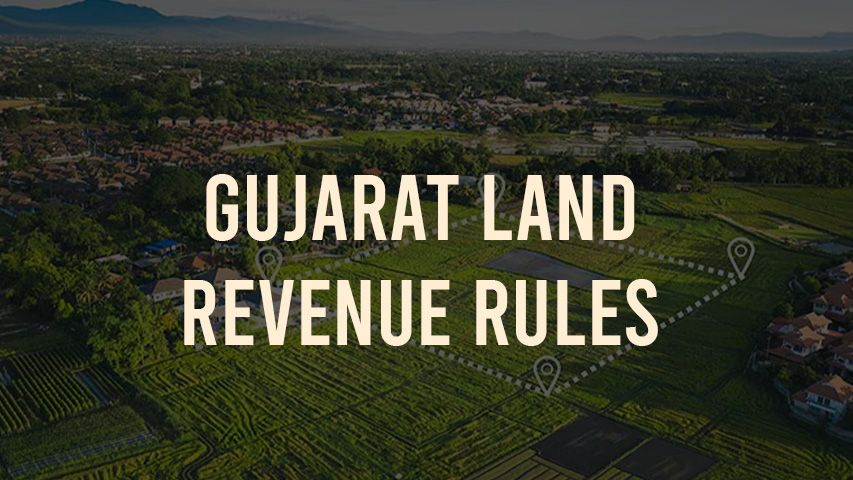
Land revenue is critical to every state's agricultural expansion, resource management, and general economic development. Land revenue in Gujarat, like in many other Indian states, is governed by a system of laws and regulations known as the Gujarat Land Revenue laws. These rules establish the framework for assessing, collecting, and administering land revenue. This article aims to provide an overview of the Gujarat Land Revenue Rules.
Contents
1. Background and Objective
2. Key Provisions of the Gujarat Land Revenue Rules
3. Impact on Agricultural Productivity, Landownership Patterns, and Rural Livelihoods in Gujarat
2. Key Provisions of the Gujarat Land Revenue Rules
3. Impact on Agricultural Productivity, Landownership Patterns, and Rural Livelihoods in Gujarat
4. End Note
Background and Objective The Gujarat Land Revenue Rules were initially implemented in 1879, with additional revisions made to accommodate the changing needs of the state's agricultural industry throughout time. The major goal of these guidelines is to promote effective and equitable land income collection while simultaneously preserving farmers' rights, ensuring sustainable land use, preventing land conflicts, and maintaining land records.
Key Provisions of the Gujarat Land Revenue Rules
Determination of Land Revenue
The rules outline the criteria and methods to determine the amount of land revenue payable by farmers, considering factors such as the type and quality of land, location, irrigation facilities, prevailing market rates, and government policies regarding agricultural development.
Land Record Management
The rules provide guidance on the maintenance and updating of land records. This includes documenting information such as ownership, boundaries, cultivators, tenancy details, and any changes or transactions related to land. Accurate and up-to-date land records are crucial for preventing disputes, facilitating land transactions, and protecting the interests of landowners.
Assessment and Revision of Land Revenue
The rules stipulate the process of assessing and revising land revenue. Periodic assessments are carried out to evaluate changes in land values, productivity, and other relevant factors. The rules ensure that land revenue assessments are fair and transparent, enabling farmers to plan their finances accordingly.
Rights and Protection of Farmers
The Gujarat Land Revenue Rules incorporate provisions to safeguard the rights and interests of farmers. This includes protection from wrongful eviction, access to tenancy rights, and regulations regarding land acquisitions for developmental projects. The rules aim to strike a balance between revenue collection and ensuring the sustainability and welfare of the farming community.
Dispute Resolution
In the event of land-related disputes, the Gujarat Land Revenue Rules provide a framework for their resolution. This may involve administrative mechanisms for settling disputes at the revenue department or, in more complex cases, recourse to the civil court system. The rules aim to expedite the resolution of disputes, enabling farmers to have access to justice and minimize the burden of prolonged legal battles.
Impact on Agricultural Productivity
Gujarat's land revenue rules have had a mixed impact on agricultural productivity. On one hand, these rules have ensured consistency in land registrations and mappings, facilitating land consolidation and enabling farmers to optimize agricultural operations. This has led to increased productivity through efficient land use and improved infrastructure development in rural areas.
However, in certain cases, the land revenue regulations have also placed restrictions on land transactions, leading to reduced incentives for investments in agriculture. The rigidity in land lease and tenancy laws has limited opportunities for landless and small farmers to access land, hindering their capability to adopt advanced farming techniques and decreasing overall agricultural productivity.
Impact on Landownership Patterns
The land revenue rules in Gujarat have played a crucial role in shaping landownership patterns. By setting regulations on land transfer and purchase, these rules have attempted to control land concentration in the hands of a few elites. The imposition of lower mandi rates and subsidy provisions for small farmers has facilitated land redistribution to some extent, reducing land inequality.
However, despite such efforts, challenges are evident. Loopholes in the regulations have allowed powerful entities to exploit certain provisions, bypassing restrictions on land concentration. This has resulted in persistent and sometimes accentuated land disparities, perpetuating social and economic inequities.
Impact on Rural Livelihoods
Gujarat's land revenue rules affect rural livelihoods in multiple ways. By ensuring land tenure security and legal recognition, these rules have protected farmers from arbitrary dispossession and helped sustain their livelihoods. Land revenue regulations have also contributed to the rural economy through revenue generation, enabling the provision of public goods and services.
However, the implementation of these rules has not been without issues. In cases where land records and surveys are inaccurate or incomplete, farmers face challenges in accessing government schemes, credit, and insurance facilities. These limitations have negatively impacted livelihood diversification and hindered the overall development of rural communities.
Role in Promoting Equity and Social Justice in Land Distribution
Gujarat's land revenue rules have aimed to promote equity and social justice in land distribution. The provision of subsidies, advantageous pricing, and reservations for marginalized groups have attempted to address historical injustices and reduce inequalities. Special land reforms have been initiated to support marginalized communities, including tribal and marginalized castes, through the distribution of surplus land.
However, challenges remain in achieving complete equity and social justice. The lack of effective implementation monitoring mechanisms, along with political and administrative factors, often undermine the intended impact of these initiatives. Nonetheless, constant improvements and reforms are being pursued to enhance the effectiveness of land revenue rules in promoting equity and social justice in land distribution.
End Note
The Gujarat Land Revenue Rules play a pivotal role in the effective administration of land revenue, ensuring sustainable agricultural practices, and protecting the interests of farmers. By outlining regulations related to land assessment, record management, rights protection, and dispute resolution, the rules seek to strike a balance between revenue collection and fostering a conducive environment for agricultural growth and development in the state.
